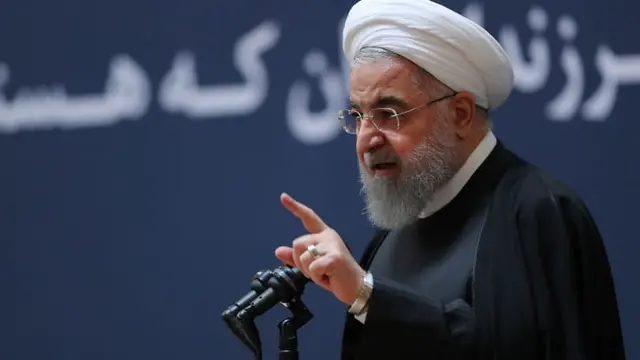Less than a week after Iran’s top military commander was killed by U.S. drone strike, the regime said Sunday that it would further scale back compliance with an international nuclear pact.
Iran will not respect any limits established in the 2015 nuclear deal on the number of uranium enrichment centrifuges, according to a state-run television broadcast. Therefore, Iran would have no limit on its enrichment capacity, the level to which uranium could be enriched, or Iran’s nuclear research and development.
While the other signatories of the nuclear deal — France, Germany, the U.K., Russia and China — have tried to keep the agreement alive, the state broadcast said Tehran’s steps could be reversed if Washington lifted its sanctions.
Tensions between Tehran and Washington have soared following Trump’s withdrawal from the landmark Iran nuclear deal brokered by the Obama administration.
The 2015 nuclear agreement lifted sanctions that crippled Iran’s economy and cut its oil exports roughly in half. In exchange for sanctions relief, Iran accepted limits on its nuclear program and allowed international inspectors into its facilities.
Last May, Iran stopped complying with some commitments in the 2015 nuclear deal that was agreed with global powers when Trump unilaterally withdrew from the landmark deal, brokered by the Obama administration, in 2018. Trump also re-introduced sanctions on Tehran that had been previously lifted in accordance with the nuclear deal.
At the time, Iran threatened to start enriching uranium at a higher level, unless world powers protected its economy from U.S. sanctions within 60 days.
President Donald Trump delivers remarks on Iran, at his Mar-a-Lago property, Friday, Jan. 3, 2020, in Palm Beach, Fla.
Evan Vucci | AP
On Thursday, the U.S. took responsibility for the death of Iran’s top general, Qasem Soleimani. On the heels of the attack, Trump said Friday that America does not seek “regime change” in Iran but that the U.S. is “ready and prepared to take whatever action is necessary” if Iran threatens American lives, Trump added.
Soleimani “made the death of innocent people his sick passion,” Trump said from his Palm Beach, Florida, resort, Mar-a-Lago. “We caught him in the act and terminated him.”
Soleimani, who led a special forces unit of Iran’s elite Revolutionary Guards, has been a key figure in Iranian and Middle East politics. He and an aide were killed in a U.S. airstrike at Baghdad’s international airport.
Iranian Quds Force commander Qassem Soleimani in Tehran, Iran on September 18, 2016.
Press Office of Iranian Supreme Leader | Anadolu Agency | Getty Images
On a call with reporters Friday, National Security Advisor Robert O’Brien described the U.S. strike as a “straightforward decision.”
O’Brien, who was with Trump during the strike, said the U.S. had credible intelligence that Iran was mounting an attack. He did not elaborate on what kind of intelligence the U.S. had.
The relationship between the U.S. and Iran took another turn for the worse last summer following a string of attacks in the Persian Gulf.
In June, U.S. officials said an Iranian surface-to-air missile shot down an American military surveillance drone over the Strait of Hormuz. Iran said the aircraft was over its territory.
That strike came a week after the U.S. blamed Iran for attacks on two oil tankers in the Persian Gulf region and after four tankers were attacked in May.
The U.S. in June slapped new sanctions on Iranian military leaders blamed for shooting down the drone. The measures also aimed to block financial resources for Iran’s Supreme Leader Ayatollah Ali Khamenei.
Tensions soared again in September when the U.S. blamed Iran for strikes in Saudi Arabia on the world’s largest crude-processing plant and oil field.
That attack forced the kingdom to cut its production operations in half and triggered the largest spike in crude prices in decades and renewed concerns of a new conflict in the Middle East. Iran maintains that it was not behind the attacks.
(CNBC)
 简体中文
简体中文

